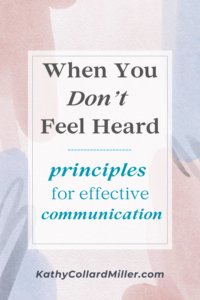When You Don’t Feel Heard
I hate the feeling of not being heard. Such a verbal exchange brings feelings of worthlessness and being de-valued–even a sense of danger–like something bad is going to happen.
Unfortunately, my natural response is to talk more, raise my voice, and think I must force the other person to understand me. Yet these are the very three responses that bring the least effective results. Instead, let’s find the healthy and effective responses from the biblical book of Proverbs.
1. Talk less than you think you should even if you feel defensive.
This can be very difficult. Although sometimes I do withdraw and shut down, other times, I try to convince with a verbal chef’s salad. I don’t realize I’m thinking (metaphorically) if the tomatoes don’t apply, maybe the sliced ham will. I throw everything I can think of toward the person.
Proverbs 10:19 urges us, “When words are many, transgression is not lacking, but whoever restrains his lips is prudent” (ESV). How true, how true. We all are able to hold our tongue and at that point things are going well. But then we reach our limit and we try to defend ourselves with many words.
Most of the time, many words get us in big trouble.
The more we say the less we are heard and understood. One temptation is adding points that aren’t relevant to the current topic. “Oh, and by the way, I’ve been meaning to tell you also about how a month ago you….” Our many words have now become more complicated and the real issue is harder to deal with.
Less is more in relationships, and especially with someone we aren’t in good connections with. Let’s ask God to help us speak less than more.
2. Keep your voice soft.
Of course such advice as “keep your voice soft” seems impossible, but it really is possible to learn. You’ll be motivated even more when you begin to see the advantages it brings.
Proverbs 15:1 tells us, “A soft answer turns away wrath, but a harsh word stirs up anger.” At the time of dealing with someone who seems against us, we feel powerless. They won’t listen nor heed what we’re saying. Everything within us wants to be heard and by golly, we’ll raise our voice to make it happen.
Don’t. It’ll be the hardest thing ever but don’t. Instead use the “broken record technique.” Just say the main point over again in a normal voice. For instance, “I hear you think I said … but I really said ….” When the person raises his voice and is defensive, again repeat softly, “I hear you think I said … but I really said…” Repeat again as needed—softly!
I remember when Larry and I were newly married, I rehearsed what I would say to him when he walked in the door. I had been thinking about confronting him all day and I was ready to give him a piece of my mind–and my frustration. I had the script carefully laid out and I knew this was the time to get it done. I would say … and then he would say …. and then I was going to say …. and he would reply … and then I was going to seal the deal.
I heard the garage door open and then close and Larry walked through the entry door. I started in on my script and he said something. So I started in on my carefully worded rebuttal.
Larry looked at me and for once, his face caught my attention. I paused.
“Kathy, I just agreed with you. Didn’t you hear me?”
I was stunned. No, I hadn’t heard him because I was too well prepared to go through my rehearsed script.
Although that was many years ago, (we just celebrated our 54th wedding anniversary), I’ve never forgotten the lesson. I haven’t always done the right thing, but remembering to use a soft answer is a part of being willing to change my script–and be heard clearly.
This is extremely hard but it is possible in God’s power. As a result, you’ll see anger is less likely to be stirred up and there’s a better possibility of a positive conversation.
3. Depend upon God to protect you and accomplish His will.
After all we’ve done, even if we softly speak with less words, our efforts may not gain us what we want. The other person may respond more aggressively and we wonder what they are thinking of us.
Our only peace must come from the truth of Proverbs 30:5: “Every word of God proves true; he is a shield to those who take refuge in him.” Our words haven’t gained us what we wanted, but God’s Word never goes wrong. He knows the truth about us and our intentions and He will protect us according to His loving will for us. We can trust Him.
What have you found helpful in applying these wise principles? I’d love to hear your wisdom.
(To study the book of Proverbs, consider my women’s Bible study, Heart Wisdom: Daughters of the King Bible Study Series.)
